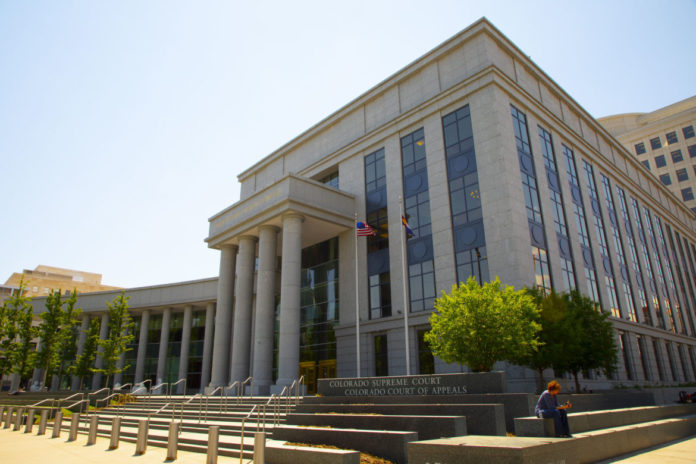
Editor’s Note: This story will continue to be updated with additional comments from attorneys involved in the case.
The Colorado Supreme Court on Wednesday said the governor went outside his power under the Colorado Disaster Emergency Act when he issued an executive order temporarily suspending a constitutional requirement to collect signatures in person for ballot measures.
“Here, we conclude that the Colorado Disaster Emergency Act … does not authorize the Governor to suspend a constitutional requirement. Thus, the Governor cannot, by executive order, create an exception to the requirement that signatures on petitions to place initiatives on the ballot be collected in person,” states the decision, adding that in the case, the court again confronted the “extraordinary impact” of the COVID-19 pandemic on the operations of electoral process within the state.
“While today’s decision is a blow to the power of the people of our state to petition, it is certainly convenient for certain groups or elected leaders have to deal with fewer ballot initiatives,” Polis said in a statement. “…But sadly it’s at the cost of making it much harder and even dangerous from a public health perspective for activists on all sides to get their issues on the ballot for voters to decide.”
The governor’s office doesn’t believe “outdated process rules should interfere with Coloradans’ right to petition,” according to the statement.
The business group Colorado Concern sued Polis and Secretary of State Jena Griswold, arguing a May 15 executive order temporarily allowing remote signature gathering for ballot initiatives circumvented the Colorado Constitution, which would have also allowed the secretary of state to make rules for remote petitioning. An individual plaintiff in the suit, Daniel Ritchie, claimed he would suffer if certain state ballot issues approved for gathering signatures became law. The suit cited a measure creating a state paid family and medical leave program and a separate measure to create a graduated income tax system.
Sarah Mercer and Chris Murray of Brownstein Hyatt Farber Schreck have represented the plaintiffs.
The executive order temporarily suspended parts of Title 1, Article 40 of the Colorado Revised Statutes, which covers language and form requirements for petitions for ballot measures, specifically the requirement for a petition circulator to be in the physically present of electors signing the petition and a notary. The complaint referenced suspensions of sections in the law that invalidate petitions that do not meet signature collecting requirements.
The complaint alleged the executive order exceeded the governor’s power under the Colorado Disaster Emergency Act and that no interference with necessary action addressing COVID-19 would happen with compliance under the article. The complaint requested expedited declaratory relief and the court to stop the Secretary of State’s office from making rules for remote signature gathering.
Previously, Denver District Court Judge Robert McGahey denied a request for a temporary restraining order and declaratory relief against the executive order.
The Supreme Court wrote in the opinion that in 1910, Colorado voters amended the state constitution to adopt initiative process, which included wording “in their own proper persons only.”
“Thus, the voters who added the initiative process to the constitution intended that petition signatories sign for themselves rather than permitting someone else to sign for them,” the opinion states. “Read together with the second cited requirement—that a registered elector attest to the validity of the signatures—we conclude that these provisions of article V, section 1 require that the personal signature occur in the presence of the person circulating the petition.”
The court said 110 years of settled practice support the conclusion. The court also cited the United States Supreme Court case Meyer v. Grant, a First Amendment challenge to a Colorado law that made paying petition circulators a felony. In the striking of that law, the Supreme Court described the petition process that “out of necessity” involves both expression of a desire for political change and merits of the change, and thus involve explanation of the proposal nature and why advocates support it.

